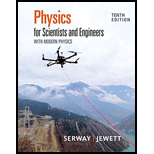
Physics for Scientists and Engineers with Modern Physics
10th Edition
ISBN: 9781337553292
Author: Raymond A. Serway, John W. Jewett
Publisher: Cengage Learning
expand_more
expand_more
format_list_bulleted
Concept explainers
Question
Chapter 44, Problem 48CP
To determine
The upper limit set on the mass of neutron by this observation.
Expert Solution & Answer
Want to see the full answer?
Check out a sample textbook solution
Students have asked these similar questions
Can someone help me
Can someone help me with this thank you
(a) For a spherical capacitor with inner radius a and outer radius b, we have the following for the capacitance.
ab
C =
k₂(b- a)
0.0695
m
0.145
m
(8.99 × 10º N · m²/c²)( [0.145
m-
0.0695
m
× 10-11
F =
PF
II
Chapter 44 Solutions
Physics for Scientists and Engineers with Modern Physics
Ch. 44.2 - Prob. 44.1QQCh. 44.5 - Prob. 44.3QQCh. 44.5 - Prob. 44.4QQCh. 44.8 - Prob. 44.5QQCh. 44.8 - Prob. 44.6QQCh. 44 - Prob. 1PCh. 44 - Prob. 2PCh. 44 - Prob. 3PCh. 44 - Prob. 4PCh. 44 - Prob. 5P
Ch. 44 - Prob. 6PCh. 44 - Prob. 7PCh. 44 - Prob. 8PCh. 44 - Prob. 9PCh. 44 - Prob. 10PCh. 44 - Prob. 11PCh. 44 - Prob. 12PCh. 44 - Prob. 13PCh. 44 - Prob. 14PCh. 44 - Prob. 15PCh. 44 - Prob. 16PCh. 44 - Prob. 17PCh. 44 - Prob. 18PCh. 44 - Prob. 20PCh. 44 - Prob. 21PCh. 44 - Prob. 22PCh. 44 - Prob. 23PCh. 44 - Prob. 24PCh. 44 - Prob. 25PCh. 44 - Prob. 26PCh. 44 - Prob. 27PCh. 44 - Prob. 29PCh. 44 - Prob. 30PCh. 44 - The various spectral lines observed in the light...Ch. 44 - Prob. 33PCh. 44 - Prob. 34APCh. 44 - Prob. 35APCh. 44 - Prob. 36APCh. 44 - Prob. 37APCh. 44 - Prob. 38APCh. 44 - Prob. 39APCh. 44 - Prob. 40APCh. 44 - An unstable particle, initially at rest, decays...Ch. 44 - Prob. 42APCh. 44 - Prob. 43APCh. 44 - Prob. 44APCh. 44 - Prob. 45APCh. 44 - Prob. 46CPCh. 44 - Prob. 47CPCh. 44 - Prob. 48CPCh. 44 - Prob. 49CP
Knowledge Booster
Learn more about
Need a deep-dive on the concept behind this application? Look no further. Learn more about this topic, physics and related others by exploring similar questions and additional content below.Similar questions
- A pendulum bob A (0.5 kg) is given an initialspeed of vA = 4 m/s when the chord ishorizontal. It then hits a stationary block B (1kg) which then slides to a maximum distanced before it stops. Determine the value of d.The coefficient of static friction between theblock and the plane is μk = 0.2. The coefficientof restitution between A and B is e = 0.8.Ans: d=1.0034 marrow_forwardFigure 29-43 Problem 12. ••13 In Fig. 29-44, point P₁ is at distance R = 13.1 cm on the perpendicular bisector of a straight wire of length L = 18.0 cm carrying current i = 58.2 mA. (Note that the wire is not long.) What is the magnitude of the magnetic field at P₁ due to i? P2° R R Larrow_forwardCheckpoint 1 The figure shows the current i in a single-loop circuit with a battery B and a resistance R (and wires of neg- ligible resistance). (a) Should the emf arrow at B be drawn pointing leftward or rightward? At points a, B C R b, and c, rank (b) the magnitude of the current, (c) the electric potential, and (d) the electric potential energy of the charge carriers, greatest first.arrow_forward
- 3. If the force of gravity stopped acting on the planets in our solar system, what would happen? a) They would spiral slowly towards the sun. b) They would continue in straight lines tangent to their orbits. c) They would continue to orbit the sun. d) They would fly straight away from the sun. e) They would spiral slowly away from the sun. 4. 1 The free-body diagram of a wagon being pulled along a horizontal surface is best represented by A F N B C 0 Ꭰ FN E a) A b) B c) C app app The app 10 app d) e) ס ח D E 10 apparrow_forwardPls help ASAParrow_forwardPls help asaparrow_forward
arrow_back_ios
SEE MORE QUESTIONS
arrow_forward_ios
Recommended textbooks for you
 Physics for Scientists and Engineers with Modern ...PhysicsISBN:9781337553292Author:Raymond A. Serway, John W. JewettPublisher:Cengage Learning
Physics for Scientists and Engineers with Modern ...PhysicsISBN:9781337553292Author:Raymond A. Serway, John W. JewettPublisher:Cengage Learning Principles of Physics: A Calculus-Based TextPhysicsISBN:9781133104261Author:Raymond A. Serway, John W. JewettPublisher:Cengage Learning
Principles of Physics: A Calculus-Based TextPhysicsISBN:9781133104261Author:Raymond A. Serway, John W. JewettPublisher:Cengage Learning College PhysicsPhysicsISBN:9781938168000Author:Paul Peter Urone, Roger HinrichsPublisher:OpenStax College
College PhysicsPhysicsISBN:9781938168000Author:Paul Peter Urone, Roger HinrichsPublisher:OpenStax College Modern PhysicsPhysicsISBN:9781111794378Author:Raymond A. Serway, Clement J. Moses, Curt A. MoyerPublisher:Cengage Learning
Modern PhysicsPhysicsISBN:9781111794378Author:Raymond A. Serway, Clement J. Moses, Curt A. MoyerPublisher:Cengage Learning College PhysicsPhysicsISBN:9781285737027Author:Raymond A. Serway, Chris VuillePublisher:Cengage Learning
College PhysicsPhysicsISBN:9781285737027Author:Raymond A. Serway, Chris VuillePublisher:Cengage Learning University Physics Volume 3PhysicsISBN:9781938168185Author:William Moebs, Jeff SannyPublisher:OpenStax
University Physics Volume 3PhysicsISBN:9781938168185Author:William Moebs, Jeff SannyPublisher:OpenStax

Physics for Scientists and Engineers with Modern ...
Physics
ISBN:9781337553292
Author:Raymond A. Serway, John W. Jewett
Publisher:Cengage Learning

Principles of Physics: A Calculus-Based Text
Physics
ISBN:9781133104261
Author:Raymond A. Serway, John W. Jewett
Publisher:Cengage Learning

College Physics
Physics
ISBN:9781938168000
Author:Paul Peter Urone, Roger Hinrichs
Publisher:OpenStax College

Modern Physics
Physics
ISBN:9781111794378
Author:Raymond A. Serway, Clement J. Moses, Curt A. Moyer
Publisher:Cengage Learning

College Physics
Physics
ISBN:9781285737027
Author:Raymond A. Serway, Chris Vuille
Publisher:Cengage Learning

University Physics Volume 3
Physics
ISBN:9781938168185
Author:William Moebs, Jeff Sanny
Publisher:OpenStax